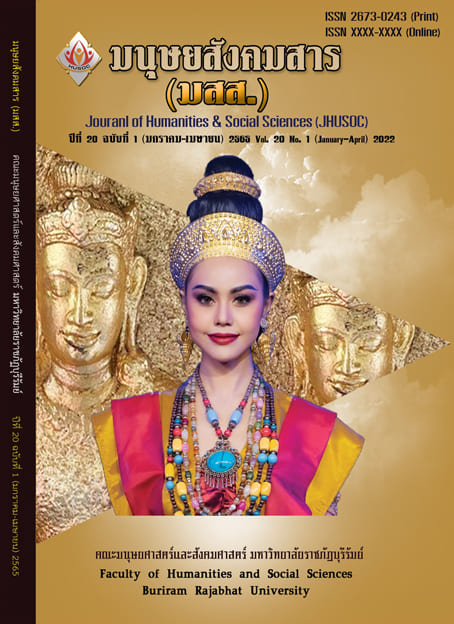ผลสัมฤทธิ์ทางการเรียนและความพึงพอใจของพนักงานต้อนรับบนเครื่องบินที่มีต่อสื่อบทเรียนอิเล็กทรอนิกส์ กรณีศึกษา บริษัทการบินไทย จำกัด (มหาชน)
Main Article Content
บทคัดย่อ
งานวิจัยนี้มีวัตถุประสงค์เพื่อพัฒนาหลักสูตรฝึกอบรมการปฏิบัติงานของพนักงานต้อนรับบนเครื่องบิน บริษัทการบินไทย จำกัด(มหาชน) ด้วยสื่ออิเล็กทรอนิกส์ โดยศึกษาผลสัมฤทธิ์ทางการเรียนในด้านประสิทธิผล ประสิทธิภาพและความพึงพอใจที่มีต่อบทเรียน เทคนิควิธีวิจัยและพัฒนาเชิงผสมผสานของการวิจัยเชิงปริมาณ กลุ่มตัวอย่างคือ พนักงานต้อนรับบนเครื่องบินผู้เข้าร่วมการอบรม จำนวน 375 คน ประมวลผลด้วยการวิเคราะห์ข้อมูลโดยใช้วิธีการทางสถิติ และการวิจัยเชิงคุณภาพผ่านการสัมภาษณ์เจาะลึกผู้มีส่วนเกี่ยวข้องในการจัดการเรียนรู้ของบทเรียนสื่ออิเล็กทรอนิกส์จำนวน 5 คน ผลการวิจัยพบว่า ผู้เข้ารับการอบรมมีผลสัมฤทธิ์ทางการเรียนสูงกว่าก่อนฝึกอบรม โดยผ่านคะแนนสอบในเกณฑ์ 80% และมีความพึงพอใจต่อบทเรียนอยู่ในระดับมาก ผู้มีส่วนเกี่ยวข้องในการจัดการเรียนรู้มีความเห็นว่าบทเรียนสื่ออิเล็กทรอนิกส์มีประสิทธิภาพต่อองค์กรมาก แต่ต้องพัฒนาเรื่องระบบการยืนยันตัวตนผู้เรียนให้แม่นยำมากขึ้น ส่วนผู้เข้ารับการอบรมเห็นว่าบทเรียนสื่ออิเล็กทรอนิกส์ควรมีเสถียรภาพมากขึ้น เพิ่มรูปแบบการสอนให้หลากหลายและมีช่องทางปฏิสัมพันธ์ระหว่างผู้เรียนและผู้สอน
Article Details

อนุญาตภายใต้เงื่อนไข Creative Commons Attribution-NonCommercial 4.0 International License.
เนื้อหาและข้อมูลในบทความที่ลงตีพิมพ์ในวารสารทดสอบระบบ ThaiJo2 ถือเป็นข้อคิดเห็นและความรับผิดชอบของผู้เขียนบทความโดยตรงซึ่งกองบรรณาธิการวารสาร ไม่จำเป็นต้องเห็นด้วย หรือร่วมรับผิดชอบใดๆ
บทความ ข้อมูล เนื้อหา รูปภาพ ฯลฯ ที่ได้รับการตีพิมพ์ในวารสารทดสอบระบบ ThaiJo2 ถือเป็นลิขสิทธิ์ของวารสารทดสอบระบบ ThaiJo2 หากบุคคลหรือหน่วยงานใดต้องการนำทั้งหมดหรือส่วนหนึ่งส่วนใดไปเผยแพร่ต่อหรือเพื่อกระทำการใดๆ จะต้องได้รับอนุญาตเป็นลายลักอักษรจากวารสารทดสอบระบบ ThaiJo2 ก่อนเท่านั้น
เอกสารอ้างอิง
Algahtani, A. F. (2011). Evaluating the effectiveness of the E-learning experience in some universities in Saudi Arabia from male students' perceptions. Durham theses, Durham University.
Andriole, S. J. (2017). Five myths about digital transformation. MIT Sloan Management Review, 58(3), 20-22.
Auksorndee, J. (2011). Marketing factors influencing satisfaction to purchase goods and services. Bangkok: Bangkok University. [in Thai]
Berman, S. J. (2012). Digital transformation: Opportunities to create new business models. Strategy & Leadership, 40(2), 16-24.
Dumnil, P. (2019). Development of learning achievement, learning course, innovation and information technology in education by using E-learning and collaborative learning of the 2nd year students in the Faculty of Art Education. Thesis. Bangkok: Bunditpatanasilp Institute. [in Thai]
Hornby, A. S. (2000). Oxford advanced learner’s dictionary of current English (6th ed.). Oxford: Oxford University Press.
Jiboonyapinit, C. (2016). Effects learning and educational achievement in the development of teaching and learning using E-learning in information technology course for students in Mathayomsuksa 1. The 11st National and International Sripatum University Conference. [in Thai]
Khongmhor, P. (2017). The guiding paradigm in online classroom development for RMUTT lecturer. Thesis. Bangkok: Rajamangala University of Technology. [in Thai]
Kolter, P. (2000). Marketing management. The Millennium Edition. New Jersey: Prentice Hall.
Laohajaratsang, T. (2017). 21st Century skills for CMU faculty development. https:// www.pharmacy.cmu.ac.th/unit/unit_files [in Thai]
Morrison, Gary R. (2010). Designing effective instruction (6th ed.). New York: Knopf. Random House.
Praijun, T. (2013). Development of online learning system of ground service department of Nok Airlines company limited department, [Thesis Graduate School]. Chiang Mai: Chiang Mai University. [in Thai]
Thai Airways International Public Company Limited. (2019). Annual Report. http://market.sec.or.th/public/idisc/th/Viewmore/ =THAI
Thammatar, T. (2014). E-Learning: from theory to practice. Bangkok: Thailand Cyber University Project, The Higher Education Commission. [in Thai]
Thongtanasin, T., & Kanperm, J. (2016). Effects of E-training media utilization on emergency equipment for the flight crews of Thai Airways International. VRU Research and Development Journal Humanities and Social Science, 10(3), 361-367. [in Thai]
Tirakanant, S. (2015). Introduction to statistics and research in education. Bangkok: Faculty of Education, Ramkhamhaeng University. [in Thai]
Smedley, A., & Morey, P. (2010). Improving learning in the clinical nursing environment: Perceptions of senior Australian bachelor of nursing students. Journal of Research in Nursing, 15(5), 75-88.
Srisuk, K. (2009). Research methodology. Chiang Mai: Chiang Mai University. [in Thai]
Salem, A. (2017). Apply of E-learning in the teaching process. Thesis. Bangkok: Minburi Business Administration Technological College. [in Thai]
Sombutwong, W. (2006). A study of learning achievement and the satisfaction of students in Mathayomsuksa IV by using E-Learning, [Thesis]. Bangkok: Srinakharinwirot University. [in Thai]
Von Leipzig, T., Gamp, M., Manz, D., Schöttle, K., Ohlhausen, P., Oosthuizen, G., Palm, D., & Von Leipzig, K. (2017). Initializing customer-orientated digital transformation in enterprises. Procedia Manufacturing, 8, 517-524.
Westermann, G., Bonnet, D., & Mcafee, A. (2014). The nine elements of digital transformation. MIT Sloan Management Review, 1-6.


